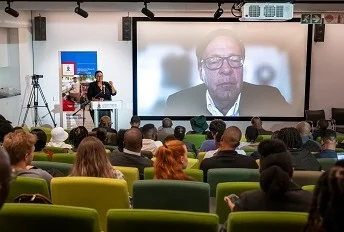World Intellectual Property Day Observed by University of Pretoria
The University of Pretoria (UP) recently joined the global celebration of World Intellectual Property Day. This year’s theme – ‘IP and SDGs: Building our common future with innovation and creativity’ – highlighted the role of intellectual property (IP) rights in driving innovation that contributes to achieving the United Nations’ Sustainable Development Goals (SDGs).
World Intellectual Property Day, which is observed annually on 26 April, serves as a platform to encourage local innovators to contribute their ideas and creations toward achieving the SDGs. Whether it’s clean energy solutions, sustainable agricultural practices or innovative healthcare technologies, intellectual property rights play a vital role in bringing these ideas to life.
UP’s World Intellectual Property Day event was held at the Javett Art Centre at UP, and brought together stakeholders from various sectors, including professors, deputy directors, researchers and academics. The programme featured keynote speeches, panel discussions as well as exhibitions that showcased innovative solutions for various SDG challenges.
The commemoration emphasised how IP rights empower individuals and businesses to develop new technologies, protect their creations and generate income. This, in turn, fuels economic growth and fosters advancements that contribute to a more sustainable future.
“The SDGS as set out by the United Nations aim to transform our world by 2030, and address five critical areas of concern: people, planet, prosperity, peace and partnership,” said Mantwa Tshabalala, Deputy Director of Fund Administration at the National Intellectual Property Management Office. “While the SDGs do not explicitly mention intellectual property, [they play] a crucial role in fostering an environment that is conducive to innovation and sustainable practices.”
“The SDGs comprise 17 goals and 169 targets, which fall under four categories: economic development, social development, environmental restrictions and good governance,” explained Professor Lars Niklasson of the Department of Management and Engineering at Linköping University in Sweden. He pointed out the need for concrete strategies, transformation theories, successful case studies and in-depth analysis to identify the most effective approaches.
The speakers collectively emphasised the power of innovation to help create a sustainable future, highlighting the importance of supporting creators and protecting their ideas to tackle global challenges like climate change and poverty.

